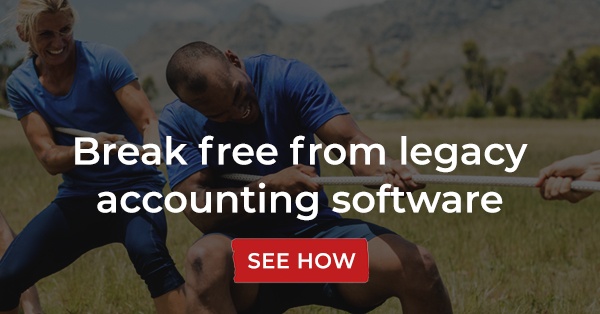Why offline accounting software is putting your business at risk

Maybe there are some key stakeholders who still aren't convinced of the advantages of cloud accounting software for your small- to medium-sized business. Or maybe you just haven't made the switch yet. What you might not realize is that every month you put it off, you’re exposing your customers’ data and your company’s future to some very real risks.
Here are the biggest concerns.
Offline accounting software puts business continuity at risk
The United States faced 24 natural disasters this year, resulting in damages exceeding $24 billion, according to NOAA. Whether they were tornados, floods, severe storms, or wildfires, many caused widespread, long-lasting power outages in addition to destroying buildings. If a catastrophic event leveled your office building tomorrow, it would take your servers and all your data with it.
Data security is more difficult
Some tech publications praise offline accounting software because it means your company is in sole control of its own data. However, that means everything related to preventing, resolving and recovering from a data breach falls on your team.
No matter how dedicated and competent your IT team is, they likely don’t have the resources that have become standard for large data centers and the cloud-based software whose data they host.
With cloud accounting software, security updates happen automatically and with no system downtime. The vendor's primary mission is to provide clients with smoothly operating software that is safe and secure, so they are incentivized to be on-time with updates, vigilant against threats and compliant with best security practices. Still, it’s imperative that your team do its due diligence when selecting a cloud software vendor, making sure to choose a reliable, well-recommended company with a proven cybersecurity track record.
Offline accounting software requires more capital costs
Offline accounting software can be tempting because of the belief that it incurs less expense. With free accounting software and other entry-level solutions available, small business owners looking to cut costs might avoid paid versions or more expensive options. Even entry-level solutions like QuickBooks Essentials costs $65 per month for three users. It's understandable to want to avoid paying a vendor every month when you could install an offline software once.
But with basic offline accounting software, you're still paying plenty — potentially even more than what a monthly subscription to a cloud solution would cost. The only difference is how the expenses are distributed. Here are just some of the expenses associated with offline accounting software:
Equipment
To store your company's financial data offline and share it among users, you need servers, which can range in price from about $1,200-$2,700 a piece. Depending on the amount of data you plan to store, you may require multiple servers.
Real estate
Servers are physical objects that take up physical space. This may mean servers taking up square footage that might otherwise be used as meeting or warehouse space, or it might mean renting or buying more office space than you otherwise would have.
Maintenance
Servers must be kept at specific temperatures to avoid overheating. You'll also need to devote time to checking up on servers' wear and tear as well as purchasing and installing replacement parts if something breaks.
Professional help
From selecting and installing the right server for your business to performing periodic software updates to making emergency repairs, many of the tasks required for housing on-premises servers are beyond the technological capacity of an average workplace — and even if they weren't, how much time do you want to devote to work that's so far outside the main mission of your company? You'll need to budget in funds for IT assistance — likely in the form of in-house professionals — when calculating the cost of offline accounting software.
Lack of scalability
With offline accounting software, your data storage is relegated to whatever your on-premises servers offer. If your newest product goes viral and your company's clientele expands rapidly, your servers can't store all of the new clients' data. Do you really want to spend time overhauling your server capacity when you could be focusing on providing the best possible experience for your new customers?
The same concept applies when you want to increase the functionality of your offline accounting software to accommodate new business needs. Maybe you've never used business intelligence tools before, but since you now offer a wider variety of products, you want to see which ones are selling well and which ones could use a marketing boost. More functionality translates to the need for more server capacity, which translates to more time and money spent on on-premises infrastructure.
Of course, this all hinges on whether you can even add functionality to your current offline accounting software. While cloud accounting solutions often offer additional applications that integrate seamlessly with your current software, increasing the functionality of an on-premises solution isn't so straightforward.
Less room for innovation
Offline accounting software leaves little room for the physical growth of your company, but that's also true when the growth you're talking about isn't literal. The most successful businesses are often the ones nimble enough to adapt to and leverage new technologies – specifically AI – as they come on the market.
With offline accounting software, there's no vendor working behind the scenes to make sure your solution is kept up to date with the latest available features and capabilities. It's on your team to stay up to date on new technologies and work to incorporate them into your accounting software. That may not be possible because integrating applications or capabilities is notoriously difficult with on-premises software.
Elevate your company’s growth with cloud accounting software
As your company grows, having efficient, reliable technology and processes can make the difference between success and failure. With so much at stake, many CFOs are recognizing the advantages of cloud accounting software. In 2023, the cloud computing market was valued at $587.78 billion. It is expected to expand significantly, reaching $676.29 billion in 2024 and surging to $2,291.59 billion by 2032. This growth reflects a robust compound annual growth rate (CAGR) of 16.5% over the forecast period according to Fortune Business Insights.
Gravity Software is a cloud accounting solution natively built on the Microsoft Power Platform. In addition to using Microsoft's robust security protocols, including multi-factor authentication and role-based user access, Gravity's position on the cloud enables us to provide our users with the latest technological advances and most beneficial integrations. These include:
- User-friendly income and expense tracking
- Multi-entity functionality designed to eliminate the need for double-entry accounting
- Accounts payable automation powered by AI
- A new payment portal designed to provide convenience for customers while helping you get paid faster and manage cash flow
- Seamless integration with Power Platform applications like Power BI and Power Automate, which regularly unveil new capabilities to enhance your operations
- The ability to integrate with Jet Reports to make consolidated reporting even easier for your multi-entity company
- Automated bank book reconciliation powered by Plaid and featuring connections to more than 12,000 banks
- A new multi-dimensional budgeting feature that allows users to categorize each expense or revenue stream
Learn more about Gravity’s latest features, and schedule an online demo when you’re ready for a closer look.
Gravity Software
Better. Smarter. Accounting


